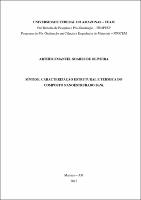| ???jsp.display-item.social.title??? |


|
Please use this identifier to cite or link to this item:
https://tede.ufam.edu.br/handle/tede/5733Full metadata record
| DC Field | Value | Language |
|---|---|---|
| dc.creator | Oliveira, Arthur Emanuel Soares de | - |
| dc.creator.Lattes | http://lattes.cnpq.br/4126775793754687 | por |
| dc.contributor.advisor1 | Souza, Sérgio Michielon de | - |
| dc.contributor.advisor1Lattes | http://lattes.cnpq.br/1782230442654231 | por |
| dc.contributor.referee1 | Nogueira, Içamira Costa | - |
| dc.contributor.referee2 | Leite, Edson Roberto | - |
| dc.date.issued | 2017-03-20 | - |
| dc.identifier.citation | OLIVEIRA, Arthur Emanuel Soares de. Síntese, caracterização estrutural e térmica do Composto Nanoestrurado Bi3Ni. 2017. 71 f. Dissertação (Mestrado em Ciência e Engenharia de Materiais) - Universidade Federal do Amazonas, Manaus, 2017. | por |
| dc.identifier.uri | http://tede.ufam.edu.br/handle/tede/5733 | - |
| dc.description.resumo | A partir da mistura dos pós elementares de bismuto (Bi) e níquel (Ni) foi produzido o composto nanoestruturado de Bi3Ni utilizando a técnica de Síntese Mecânica. As propriedades estruturais da amostra foram investigadas por difração de raios X, combinado com o método de Rietveld. Com o objetivo de estudar a estabilidade térmica e acompanhar o comportamento estrutural da amostra, em função da temperatura, foram realizadas medidas de DRX in situ, além de medidas de calorimetria diferencial de varredura – DSC. O processo de moagem totalizou 19 horas, após a décima terceira hora de moagem não há ocorrência de novas fases, apenas ocorreu uma melhora da taxa de cristalização e uma diminuição do tamanho de cristalito. Encontra-se presente um pico alargado. A forma, perfil, dessa elevação é um forte indicio do aparecimento de uma fase amorfa. Os resultados do DSC, em conjunto com DRX, revelam a dinâmica de nucleação e transformação de novas fases, como o Bi12NiO19 e o Bi2O3, que passam a se formar à medida que a amostra é aquecida. Com a utilização da equação de Kissinger foi possível calcular a energia necessária para nucleação desta nova fase. Realizou-se um tratamento térmico com a finalidade de promover a cristalização da fase amorfa presente, bem como, de estudar a evolução estrutural do composto em função da temperatura. O meio utilizado para sintetização da liga Bi3Ni mostrou-se eficiente e as análises estruturais e térmicas utilizadas nesse trabalho demonstram a concordância e a consistência dos resultados obtidos e dos objetivos propostos. | por |
| dc.description.abstract | From the mixture of the elementary powders of bismuth (Bi) and nickel (Ni), the nanostructured compound of Bi3Ni was produced using the Mechanical Synthesis technique. The structural properties of the sample were investigated by X-ray diffraction, combined with the Rietveld method. In order to study the thermal stability and to follow the structural behavior of the sample, as a function of temperature, XRD measurements were performed in situ, in addition to differential scanning calorimetry (DSC) measurements. The milling process totaled 19 hours, after the thirteenth hour of milling there was no occurrence of new phases, only an improvement of the crystallization rate and a decrease of the crystallite size occurred. An enlarged peak is present, the shape and profile of this elevation is a strong indication of the appearance of an amorphous phase. The results of the DSC, together with XRD, clarify the dynamics of nucleation and transformation of new phases, such as Bi12NiO19 and Bi2O3, which starts to form as the sample is heated. With the use of the Kissinger equation, it was possible to calculate the energy required for nucleation of this new phase. A thermal treatment was carried out in order to promote the crystallization of the present amorphous phase, as well as to study the structural evolution of the compound as a function of temperature. The medium used to synthesize the Bi3Ni alloy proved to be efficient and the structural and thermal analyzes used in this work demonstrate the consistency and consistency of the results obtained and the proposed objectives. | eng |
| dc.description.sponsorship | FAPEAM - Fundação de Amparo à Pesquisa do Estado do Amazonas | por |
| dc.format | application/pdf | * |
| dc.thumbnail.url | http://tede.ufam.edu.br//retrieve/17044/Disserta%c3%a7%c3%a3o%20-%20Arthur%20Emanuel%20Soares%20de%20Oliveira.pdf.jpg | * |
| dc.language | por | por |
| dc.publisher | Universidade Federal do Amazonas | por |
| dc.publisher.department | Faculdade de Tecnologia | por |
| dc.publisher.country | Brasil | por |
| dc.publisher.initials | UFAM | por |
| dc.publisher.program | Programa de Pós-graduação em Ciência e Engenharia de Materiais | por |
| dc.rights | Acesso Aberto | por |
| dc.rights.uri | http://creativecommons.org/licenses/by-nc-nd/4.0/ | - |
| dc.subject | Difração raios X (DRX) | por |
| dc.subject | Síntese mecânica | por |
| dc.subject | Método de Rietveld | por |
| dc.subject.cnpq | ENGENHARIAS: ENGENHARIA DE MATERIAIS E METALURGICA | por |
| dc.title | Síntese, caracterização estrutural e térmica do Composto Nanoestrurado Bi3Ni | por |
| dc.type | Dissertação | por |
| Appears in Collections: | Mestrado em Ciência e Engenharia de Materiais | |
Files in This Item:
| File | Description | Size | Format | |
|---|---|---|---|---|
| Dissertação - Arthur Emanuel Soares de Oliveira.pdf | 3.58 MB | Adobe PDF |  Download/Open Preview |
This item is licensed under a Creative Commons License





